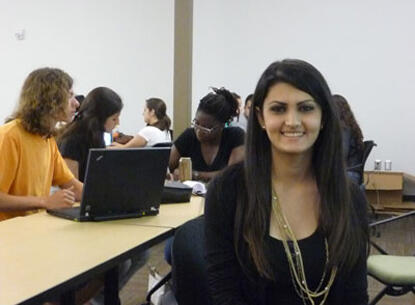
July 23, 2010
Iraqi Young Leaders Social Media Initiative at VCU Teaches Social Media Networking, Community Engagement and Cultural Awareness
Share this story
Nearly two dozen undergraduate students from Iraq are learning about social media, community engagement and service learning, and cultural understanding during a summer study program at Virginia Commonwealth University.
The Iraqi Young Leaders Social Media Initiative is funded by the U.S. Embassy in Baghdad and implemented by the Academy for Educational Development to help 50 highly motivated undergraduate students from Iraq study in the United States.
This is the second summer that VCU has participated in the program. Another group of Iraqi students is currently studying at the University of Massachusetts Amherst.
This year, VCU’s VCU School of Mass Communications and Office of International Education
collaborated on a four-week academic and cultural experience, anchored by a social media networking course by mass communications professors Marcus Messner and Jeff South. In addition to lectures, the professors bring in guest speakers and lead the students on field trips to nonprofit groups and traditional media and new media venues.
There are 23 Iraqi students, many of them studying information technology at home. Another 15 VCU undergraduate students and nine VCU advanced degree students are also enrolled in the course.
“Every day when I go to class, I am amazed at how well they work together,” said Marcus Messner, Ph.D., an assistant professor in the VCU School of Mass Communications.
The course also features a strong community engagement and service learning component. Students have worked with Big Brothers Big Sisters of Greater Richmond & Tri-Cities, and taught computer skills to the unemployed and homeless at the Carver Community Center. The Iraqi students are also learning about the role of nonprofit groups in the United States.
“We want to expose them to how nonprofit groups support American life,” said Jeff South, Ph.D. “The students are surprised at the way non-profits work with kids, help needy people and promote the environment. And they’re realizing how social media can be used to help meet the needs of non-profit groups.”
The class has been separated into 10 teams. Each team has selected a nonprofit client in the Richmond area and will develop and implement a social media strategy for them, employing Facebook, Twitter, You Tube and other social media platforms. The students will showcase their strategies on July 29 at a Social Media Club of Richmond event in the VCU Student Commons.
“The goal for this course is for the Iraqi students to learn social media skills here and put them into use in positive ways in Iraq,” Messner said.
The experience is also helping students from both countries gain greater cultural understanding.
Before arriving at VCU, the students spent a week in Washington, D.C. While, in Virginia, they’ve hiked mountains, visited Colonial Williamsburg and Virginia Beach, participated in Richmond’s First Friday Arts Walk and spent the Fourth of July with local families, which was one of the best experiences for Shahd Layth Hamid, an information technology student from Erbil, Iraq.
“American people are different to what we see on TV,” Hamid said. “I think we had mistaken impressions of what Americans would be like and they have mistaken impressions of us. For example, they think that all Iraqi women are covered by veils. So I have been able to learn something and teach something.”
Hamid and the other Iraqi students have been sharing their impressions and experiences at VCU and in the United States through blogs.
Many of the students expressed surprise at how close many American families are.
“I went to a family farm, and I saw that the connections and the relations between family members were very strong. It was one of the happiest days in my life,” wrote Salwa Hashim Muhammed Al-Khateeb, who is studying English literature at Basrah University.
Others said Americans rely on government far less than Iraqis.
“In Iraq, when we have poverty or homelessness, everyone blames the government. No one does anything about it. Americans appear to be participatory citizens, working with the government to fix the problems, or they will fix it by themselves with the help of non-government and nonprofit organizations,” wrote Marwan Fattah Ismael, who is studying information technology at the American University of Iraq-Suliamani.
Some hope to use what they’ve seen in the U.S. to create a better Iraq.
“I hope someday that my country will be like the U.S., where different people live together peacefully, and that they will support each other to reach the level of development that will make the Iraq a wonderful country,” wrote Zainab Abdulmunem Khaleel, who studies Computer Engineering at the University of Basrah.
Though some of the visitors admit to being a little homesick, all agree their visit to the United States will always hold a special place in their hearts.
“We will go back to Iraq soon, but a part of us will always stay here in Richmond,” wrote Ruaa Talal Jumaah, who studies English at the University of Baghdad.
All of the entries may be found at Richmond.com's Iraqi Young Leaders Exchange Program Blog. The blog entries have caught the attention of officials at the White House, who have asked the students to collaborate on a single blog entry which could be posted on the White House blog.
The students will leave Richmond on Aug. 1 for New York City, where they will be reunited with the students studying in Massachusetts for a week of sightseeing before returning to Iraq.
Subscribe to VCU News
Subscribe to VCU News at newsletter.vcu.edu and receive a selection of stories, videos, photos, news clips and event listings in your inbox.










